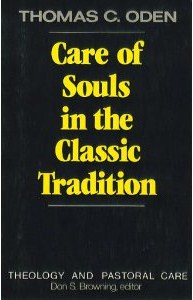Care of Souls in the Classic Tradition – Thomas Oden (1984)
 Tuesday, February 1, 2011 at 12:15PM
Tuesday, February 1, 2011 at 12:15PM  Care of Souls was an excellent book that introduces a history of pastoral care. In it Thomas Oden reviews the current state of modern pastoral caregiving (as of 1984). In his first section of the book, he broadly covers what he sees as some deficiencies in current practices, especially related to the concentration on psychological therapies being incorporated into the pastoral sphere of practice. Oden adds warnings about the ineffectiveness of these therapies (both in application by experts in that field, but also in the specific realm of church pastoral care). Warnings about the secular incorporation of care therapies being introduced into the pastoral field are coupled with a short explanation of lack of influence from the classical literature of the Christian tradition on the same pastoral leaders. Oden presents his concern that the psychotherapies are replacing the historically proven methods of the classical pastoral care writings and wisdom. This was a surprising (and impactive) concept that I took from the book- the idea that psychological methods were replacing pastoral care among pastors. Oden states it this way:
Care of Souls was an excellent book that introduces a history of pastoral care. In it Thomas Oden reviews the current state of modern pastoral caregiving (as of 1984). In his first section of the book, he broadly covers what he sees as some deficiencies in current practices, especially related to the concentration on psychological therapies being incorporated into the pastoral sphere of practice. Oden adds warnings about the ineffectiveness of these therapies (both in application by experts in that field, but also in the specific realm of church pastoral care). Warnings about the secular incorporation of care therapies being introduced into the pastoral field are coupled with a short explanation of lack of influence from the classical literature of the Christian tradition on the same pastoral leaders. Oden presents his concern that the psychotherapies are replacing the historically proven methods of the classical pastoral care writings and wisdom. This was a surprising (and impactive) concept that I took from the book- the idea that psychological methods were replacing pastoral care among pastors. Oden states it this way:
What curious fate has befallen the classical tradition of pastoral care in the last five decades? It has been steadily accommodated to a series of psychotherapies.[1]
In the second main section of the book Oden gives a brief biography of Gregory the Great, the pope who lived in the 6th and early 7th centuries. This overview was helpful in understanding the context and time of Gregory’s life and his impact on the broader church and western world.
The final section of the book is specifically dedicated to a sketch of the main findings taken from Gregory’s most well known writing, “Pastoral Care”. He covers a myriad of topics, all sourced in Gregory’s treatise. Of particular importance to Oden was Gregory’s keen mind, analytical abilities, and dialectic model of teaching pastors how they might evaluate, diagnose and administer pastoral care. Oden, queuing from Gregory, fixates most of this section on the paradoxical personality and behavioural traits taken on by major styles of people. It is almost uncanny, the level of perceptive understanding that Gregory reveals almost 1400 years before modern psychology would draw some similar conclusions about personalities, behaviours and understanding of the inner self.
One point that was significant to me in this section was the idea that the key to proper pastoral critique is to draw analogies and arch-types, allowing the person to see themselves in such symbolisms allowing the to make personal discovery of their own faults based on their own conscience. Oden say it succinctly here:
The pastor proceeds by analogy so that the person being challenged will come up with a self-judgment based on the person's own conscience... Enabling one's conscience to become transparent to oneself constitutes a more significant pastoral service than harangue or castigation.[2]
Oden reviews many other concepts of Gregory’s extensive and insightful pre-modern study of the human soul and emotions, and his practical help for pastors who are working to care for them. It is an excellent book with little questionable or objectionable materials.
Product Link: Care of the Souls in the Classic Tradition (Theology and pastoral care series)
Review by Kim Gentes
[1]Thomas C. Oden, Care of Souls in the Classic Tradition (Philadelphia, PA: Fortress Press, 1984), Pg 28
[2]Ibid., Pg 90
Reader Comments